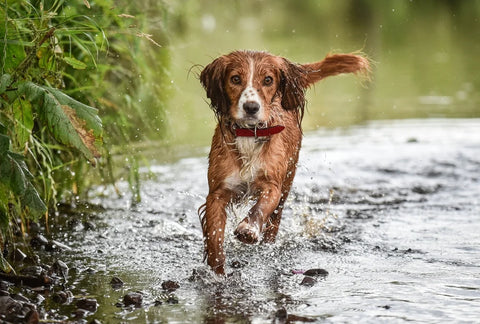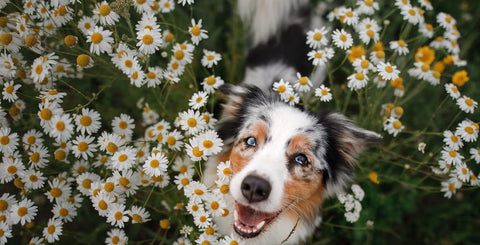

Do dogs get colds?
Answer: While it is possible for dogs to get colds, this doesn’t happen nearly as often as it does in people. If your dog is unwell, don’t worry, it won’t have been caught from you - the human ‘common cold’ doesn’t normally affect dogs. A canine-specific cold virus could be to blame for your dog’s symptoms, but there might be something much more serious going on.
We’re going to explore some of the possible causes of cold-like symptoms in dogs, as well as what you should do if you think your dog is unwell.
Do dogs catch colds from humans?
Dogs can’t catch colds from humans. Human colds are caused by an array of different viruses which are just grouped together because they all cause similar symptoms. In humans, rhinoviruses, influenza viruses, coronaviruses, and parainfluenza viruses all cause runny noses, sneezing and sore throats. Most of these are species-specific, meaning that it's very unlikely they will pass from you to your dog.
While similar dog cold viruses do exist, they are not seen or diagnosed as commonly as human illness. Also, there are some other, potentially more serious, infections out there that can cause very similar symptoms in our pets, including kennel cough and fungal disease. For these reasons, it is always best to call your vet if your dog is unwell or acting out of character, to get a proper diagnosis.

Do dogs get human flu?
Dogs can suffer from dog flu (canine influenza), but not human flu, so they won’t catch your illness. Canine influenza virus is rare in the UK, but outbreaks are occasionally seen in the US. Canine parainfluenza is a much more common infection in this country, which is one of the causes of kennel cough.
Dogs and cold symptoms
Dogs with an array of different respiratory diseases can all have similar cold-like symptoms. These include:
- Sneezing
- Coughing
- Runny eyes
- Increased discharge from the nose
- Reduced appetite
Causes of cold-like symptoms in dogs
A number of conditions could cause cold-like symptoms in dogs. These include –
1. Dog colds
Do dogs get colds? Dogs certainly can get infections that cause sneezes and snuffles, but colds aren’t seen as commonly as they are in humans. Like human colds, dog colds could be caused by a number of different viruses. Your vet may refer to this as an upper respiratory tract infection. Most are self-limiting, but affected dogs may need rest and monitoring.
2. Kennel cough (canine infectious tracheobronchitis)
A very contagious respiratory infection, commonly caused by a bacterium called Bordetella bronchiseptica and canine parainfluenza virus. It causes a characteristic, retching or hacking cough and possibly other symptoms like a runny nose. Vaccination is available to protect against this illness.
3. Distemper virus
Distemper is a potentially fatal disease that can cause respiratory symptoms, including coughing, nasal discharge, runny eyes, and breathing issues. Affected dogs may also exhibit neurological symptoms. Vaccination is available to prevent this disease.
4. Allergies
Some dogs react to environmental allergens, including grass and tree pollens. Read our guide on hayfever in dogs. Symptoms are often seasonal and may include a runny nose and eyes, as well as sneezing.
5. Parasitic infections
Lungworm could cause symptoms like coughing and lethargy. In other countries, parasites like heartworm, nasal mites, and tongueworm are more common and could cause respiratory issues.
6. Foreign body
A foreign body stuck in the nasal passages could set up inflammation, leading to sneezing and increased discharge.
7. Fungal infections
Fungal infections can cause nasal discharge, sneezing, and lethargy. Sinonasal aspergillosis is an example of this, but thankfully, it is currently rare in the UK.
Other issues – heart failure, pneumonia, tracheal collapse, and cancer could all cause coughing
How to treat a dog with a cold?
Treatment will depend on the underlying cause of your dog’s symptoms. This is why it is important to get your dog examined by a vet. Getting your dog checked over will help to rule out serious disease and ensures they receive the right care.
Your vet will start by doing a physical exam, which will include checking their eyes, listening to their chest, and taking their temperature. They will also check your dog’s vaccination status and ask you about their symptoms.
If they have concerns following this examination, they may recommend some further tests. These could include blood tests, swabs for infectious disease, and X-rays.
Some mild respiratory infections may resolve on their own, but medications such as anti-inflammatories, antibiotics for secondary infections, and cough suppressants could be needed.
How to boost your dog's immune system
Vaccination is one of the best ways to boost your dog’s immune system. It primes your dog’s immune response, meaning that it will be ready if they become infected with that disease in the future. While it’s not possible to protect your dog against every single infectious agent out there, we can certainly vaccinate against kennel cough and distemper virus. There is no vaccination for mild colds in dogs, just like there is no vaccine available for human colds – there are just too many viruses that cause cold symptoms!
Ensuring your pet is on a good-quality complete diet, which is appropriate for their age and size, will also support their immune system. Receiving the right nutrition is key to your dog’s overall health and well-being.
Nutritional supplements may be useful under the right circumstances, but there is no specific supplement that completely protects against respiratory infections or disease. Consult your vet for advice if your pet has a compromised immune system that leaves them more susceptible to illness.
Conclusion – Do Dogs Catch Colds?
Do dogs gets colds? Dogs can’t catch colds from people, and while they can indeed get dog-specific colds, these aren’t common. Coughing, sneezing, and nasal discharge are seen in many different respiratory diseases, so it is important to get your dog checked over if they are showing any of these signs. It could be nothing to worry about, but it’s best to make sure your dog receives the right care. Contact your vet for advice sooner rather than later if your dog is under the weather.
Important health information: The content of this blog is for information purposes only and isn't a substitute for professional veterinary advice. If you're worried about your pet's health, please contact your vet.




